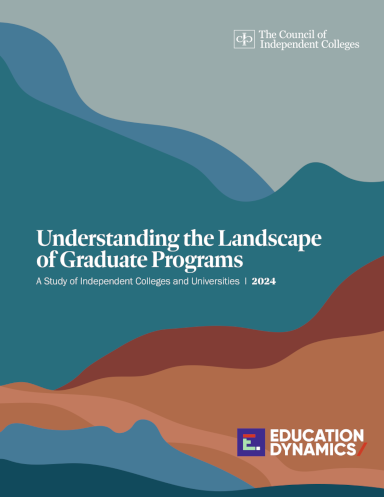Institutional Members of the Council of Independent Colleges are increasingly offering graduate programs. A decade ago, in 2013–14, only 45 percent were classified as Carnegie Masters or Doctoral. In 2023–24, 55 percent fall in these categories. To better understand how independent colleges build, support, and sustain graduate programs and students, CIC surveyed presidents and chief academic officers at member institutions to:
- Analyze current and potential graduate program offerings
- Recommend shared initiatives to support graduate programs
- Outline resources needed to support those initiatives
This report shares the context in which independent institutions are offering graduate programming and insights from their survey responses. A variety of factors has led to the growth of and demand for graduate programs. Politicians, families, and the public have pressured the higher education sector to adopt professional and vocational programs that can provide skills for jobs. The 2008 recession drove students back to school as the economy slowed. Technological advances provided greater access as education could increasingly be provided remotely online. And, of course, the COVID-19 pandemic drove almost all institutions to bolster online learning and decreased the international student pipeline. At the same time, the looming demographic cliff (a decline in birth rates leading to a smaller market for traditional undergraduate students) spurred institutions to consider other sources of revenue.
At the time of the survey (Winter/Spring 2024), over three-quarters (78 percent) of CIC member institutions were offering graduate courses. Newer programs were more likely to offer remote options. Student services, such as housing and childcare, were generally focused on undergraduate students. Nonetheless, many institutions are relying on graduate programs to generate revenue. As institutions bring on new programs, decisions are driven more by internal campus voices than by external community partners and employers. Institutions feel secure in their ability to design programs, and support and assess their curricula; they seek assistance in recruitment of students, especially international students, in gathering market data, and in writing grants to fund new graduate programs.
CIC intends to use the findings from this survey to assist institutions and university leaders in anticipating graduate market trends and building sustainable graduate programs that serve student needs and deliver transformative educational outcomes.




